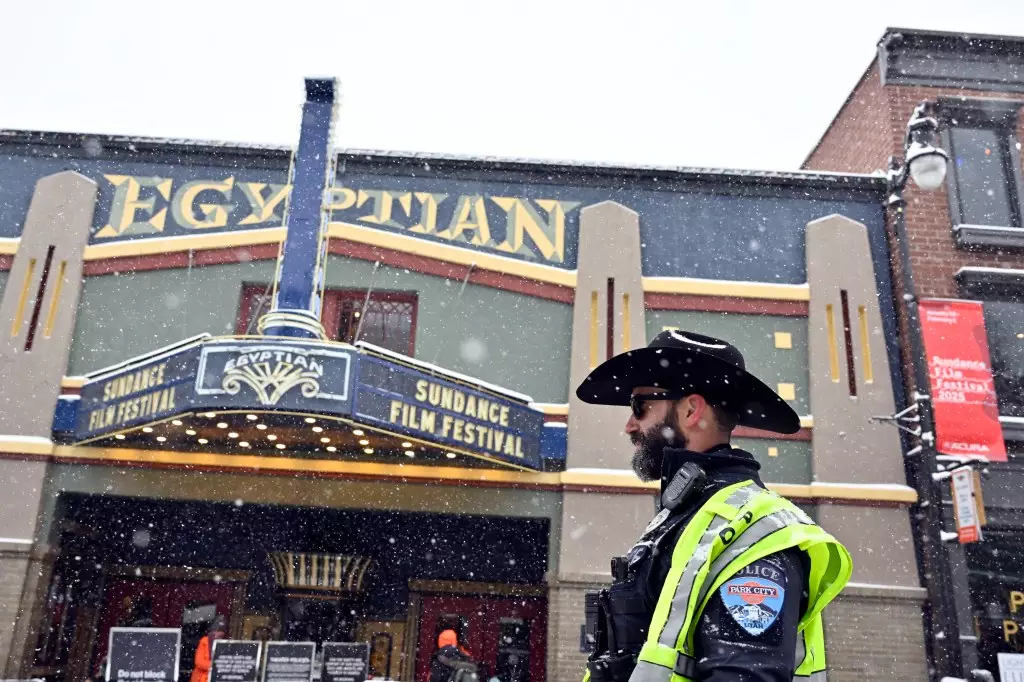As Utah’s Governor Spencer Cox faces an impending decision on whether to sign or veto House Bill 77—an alarming measure that seeks to prohibit the Pride Flag from being displayed on government buildings—the future of the Sundance Film Festival hangs precariously in the balance. Park City Mayor Nann Worel’s recent address underscored a growing sense of urgency regarding the festival’s status in the Beehive State. The collaborative effort to transform Sundance into a dynamic cultural hub, envisioned as a blend of Park City’s charm and Salt Lake City’s accessibility, now feels overshadowed by regressive political movements.
With powerful detractors leveraging legislative tools to further outmoded ideologies, it’s no wonder that Sundance director Eugene Hernandez is grappling with critical timelines and competitive bids from other cities eager to claim this cultural jewel. The implications go far beyond the film festival; they signify a deteriorating atmosphere for inclusion and creativity that is vital for Utah’s cultural identity.
Pride in Danger: The Political Climate
House Bill 77, affectionately dubbed the Flag Display Amendments, represents a dire political maneuver within Utah’s Republican-dominated legislature. The bill aims to strip LGBTQ+ communities of visibility and acknowledgment, resulting in a crisis for organizations like Sundance, which thrive on principles of diversity, inclusion, and artistic freedom. This legislation is not merely an affront to queer visibility; it serves as a symbolic blockade to the progressive evolution of Utah itself. With a daily fine of $500 for each flag displayed on state-funded buildings, it reflects a regime intent on maintaining a homogeneously conservative narrative—one that stifles dialogue and creativity.
While Mayor Worel and other local leaders attempt to persuade lawmakers of the negative ramifications this bill may have on not just Sundance but the entire state’s tourism and cultural engagement, their appeals have been met with skepticism. Politicians like Rep. Trevor Lee and Sen. Daniel McCay have been unequivocally hostile, framing artistic expressions and cultural festivals in pejorative terms. This assault on acceptance casts a dark shadow over Utah’s potential to cultivate an inviting and forward-looking atmosphere.
Funding and Future Prospects
Adding to the urgency of the situation is the substantial financial boon that Sundance brings to Utah. With more than $3.5 million recently allocated by state legislators to keep the festival grounded, the stakes have never been higher. However, the looming threat posed by House Bill 77 might undermine all these financial efforts, making it a pyrrhic victory. Why should filmmakers, artists, and even visitors who champion diversity invest their time and money in a state that seems to categorically reject their existence?
Cities like Boulder, Colorado, and Cincinnati, Ohio, are ready to embrace the festival wholeheartedly. Their offers undoubtedly come with an assurance that inclusivity and acceptance will be front and center. For a festival rooted in the spirit of storytelling and diverse cultural expressions, accepting such bids may become a necessity rather than a luxury. This landscape poses critical questions about the values Utah wants to project to the world.
The Emotional Toll on Local Leaders
Worel’s poignant remarks reverberate as she reflects on her tenure and the inevitable changes that lie ahead. There’s a palpable sense of loss as she considers the trajectory of the festival and its potential exit from Utah—none of which would have been conceivable just a year ago. Indeed, the enthusiasm surrounding the prospect of a reimagined Sundance in Utah is quickly dissipating into something more akin to resignation.
The heavy emotional toll on local leaders is palpable; an overwhelming sense of pride entwined with despair permeates the dialogue. Worel’s assurance that Park City will “thrive” regardless of Sundance’s trajectory is admirable but holds an unsettling implication: the fight for cultural essence in Utah is becoming a battle fought more in defense than in aspiration.
A Call for Action and Resistance
In a political climate that appears increasingly hostile to progressive ideals, it becomes essential for local communities, artists, and citizens to galvanize against regressive policies that stifle voices and visibility. As Utah slipslines into a more confining mold, the potential exodus of an iconic festival like Sundance underscores the urgent need for advocacy and resistance.
An open dialogue, community engagement, and relentless advocacy are imperative if any semblance of cultural richness is to be preserved. Mayor Worel and her allies cannot face this challenge alone; a consortium of community members must stand together to foster an inclusive atmosphere, ultimately demonstrating that Utah is more than its political leadership. It is a vibrant tapestry of stories, experiences, and identities that deserve expression, recognition, and celebration.


Leave a Reply